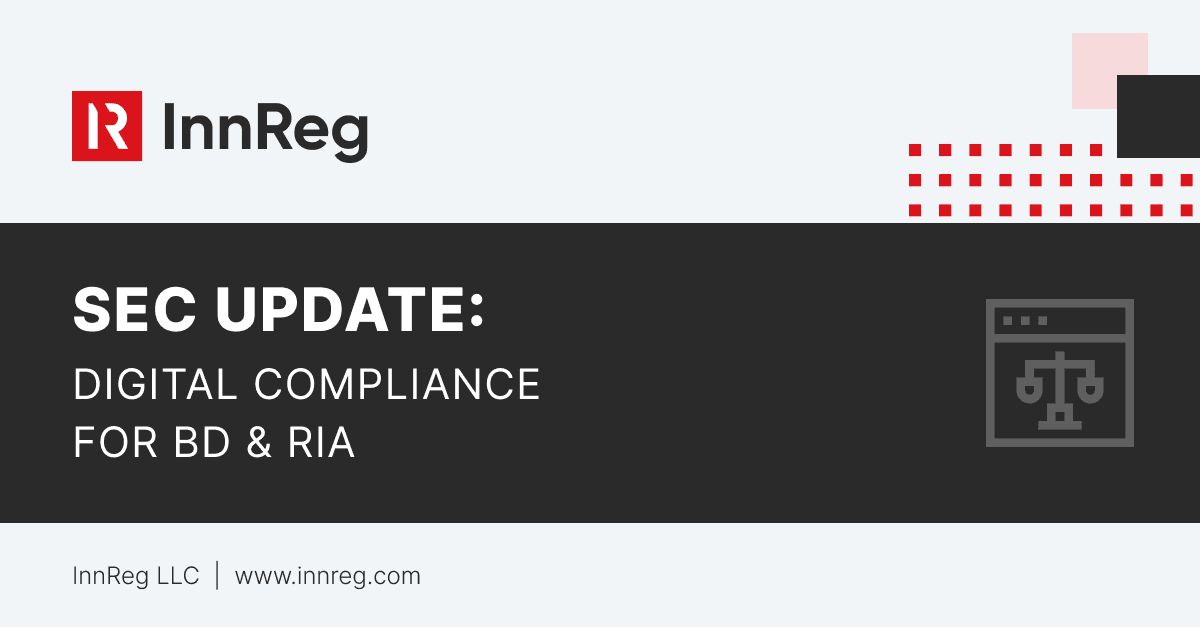
All Fintech
SEC Update: Digital Compliance for BD and RIA Digital Engagements
Aug 9, 2023
·
InnReg
·
7 min read
Contents
Digital compliance is high on the agenda for legal and regulatory stakeholders. Authorities have begun to outline new regulations to address the increase in fintech solutions in the market and in apps that make it easier to trade frequently. You may think your business is completely compliant today - but the ground may yet shift under your feet.
At the end of this summer, the US Securities and Exchange Commission issued a public request for information on their website: “Request for Information and Comment on Broker-Dealer and Investment Adviser Digital Engagement Practices, Related Tools and Methods, and Regulatory Considerations and Potential Approaches; Information and Comments on Investment Adviser Use of Technology.”
Such public requests typically precede new SEC rules and guidelines for industry behavior. The resulting agency rules ultimately generate the most impact on daily corporate operations, including fintech compliance.
The request is intended to provide the SEC with more information on digital engagement practices in the financial industries, including social networking tools, investing games and contests with prizes, digital badges, and leaderboards, notifications, celebrations for trading, and chatbots. While the request was open to the public, the SEC especially encouraged retail investors to comment on their experiences.
See also:

InnReg is a global regulatory compliance and operations consulting team serving financial services companies since 2013. If you need assistance with compliance or fintech regulations, click here.
What Prompted The SEC Enforcement Actions?
The recent success of online brokers and investment advisers, such as Robinhood Markets, prompted the SEC’s actions to gather more information about digital practices in the financial industry.
These companies have attracted millions of novice investors over a short period of time, largely due to game-like applications and features like zero-commission trading. Coupled with the rise of “meme stocks,” such as GameStop, and the subsequent growth of online forums like Wallstreetbets, the SEC decided to take a closer look at industry practices, in an effort to mitigate potential fintech risk.
“In the last few years, we’ve seen a proliferation of trading apps, wealth-management apps, and robo advisers that use these practices to develop and provide investment advice to retail investors,” SEC Chairman Gary Gensler said. “In many cases, these features may encourage investors to trade more often, invest in different products, or change their investment strategy.”
Indeed some brokerages do use push notifications, colorful imagery, and lists of “hot stocks” to improve and enhance their applications and encourage users to check in on their apps more often.
Others, like eToro, use social networking methods such as following other users and their activities, or even providing an ability to copy another user's portfolio (notwithstanding that the SEC has warned already that “copy trading in securities may raise regulatory concerns under the U.S. federal securities laws”).
Key Digital Compliance Issues Behind SEC Inquiries
The key question behind SEC Requests For Information is very direct. The goal is to discover any outreach activities that investment and financial platforms employ as a part of their business model and which constitute an investment recommendation. Moreover, when they do cross regulatory lines, fintechs are likely to fail compliance health checks. In order to be compliant, they would have to implement high standards of conduct and may require enhanced transparency and compliant operating procedures.
On the flip side, neither the SEC nor the Financial Industry Regulatory Authority (FINRA), which oversees brokers, has so far come up with clear definitions to support these recommendations. If such a definition existed, it would be easier to make sense of the SEC’s current predicament with respect to the booming market of applicative retail investing.
Definitions would make it much easier for companies to satisfy requisite levels of broker-dealer and Fintech compliance. Still, the only guidance that exists within the regulatory framework is that the SEC requires brokers to avoid putting their own interests ahead of their clients’, and investment advisers to follow a fiduciary standard requiring them to place the client’s interests ahead of their own.
The SEC has stated, as part of their request for inputs, that “the more individually tailored the communication to a specific customer or a targeted group of customers about a security or group of securities, the greater the likelihood that the communication may be viewed as a ‘recommendation’.”
Most online broker-dealers say that tech tools simply exist to make the investing process less intimidating to those who are new to it. However, the regulators’ fears are still not quite allayed.
With a growing number of diverse technological solutions designed to ease trading, such as those Chairman Gensler mentioned in his official statement, regulators believe that investors might trade more often or make riskier calls. That behavior might potentially expose them to higher losses while brokerages revenues soar.
Robinhood $65M Fine
Robinhood generates revenue from transactional activity by selling the rights to execute a customer’s order to other parties, such as high-speed trading firms. In December 2020, the online broker-giant paid a $65 million fine to the SEC, following charges of having deceived its customers about how it made money by funneling customer orders. Robinhood paid the fine without denying or admitting to SEC’s findings, even though this activity has been its biggest revenue source.
In addition, in the wake of growing scrutiny of stock trading gamification, Robinhood has abandoned a feature of its app. The app no longer displays digital confetti on the screen for celebrating certain occasions, such as a users’ first trade, a change intended to make it look less like a game. While Robinhood’s level of Fintech compliance increased, it unquestionably had to pay a steep price.
The Best Broker-Dealer Compliance is Digital Compliance
What is the best method to ensure safe and compliant business operations? The best defense consists of timely preparation, knowing of the potential pitfalls of the current legal and regulatory framework, and keeping a finger on the pulse of its development. In one word, tighten up your fintech’s compliance processes.
Digital compliance - using digital tools to conduct complex compliance processes - could be a critical aid factor. Digital compliance tools - even those that number a single individual - empower companies to be better prepared for tackling all sorts of regulatory requirements put before them.
And, companies of all sizes better be ready to use these tools. It is no small feat to oversee the complex work of following the ebbs and flows of developing legislation and regulatory rules surrounding, for example, data protection, competition, cybersecurity, financial services, or IP.
The Distinctive Role of the CCO
Precisely for this reason, Fintech companies have begun separating the roles of General Counsel and Chief Compliance Officer. But that is often not enough. Designing rigorous and detailed compliance processes to ensure that your Fintech’s compliance levels are high and fintech risks are low is daunting and time-consuming.
Having the compliance team involved in business decision-making from the get-go is crucial. In order to do that, digital compliance needs to be developed in parallel to the core business. With the fintech landscape changing daily, it could prove difficult to focus on both growing the business and ensuring low levels of fintech risk.
It is essential to appoint an experienced executive with a compliance-oriented mindset to watch the company's inception and growth, and to conduct discussions on the company's strategy. At the same time, engaging an existing expert consultant like InnReg to aid with growth and compliance processes design and implementation could prove to be the difference between success or failure.
Of course, compliance should not replace the role of the legal department. However, having an advisor dedicated to detecting potential regulatory issues and demands, devising response strategies, and deploying internal policies is invaluable, especially in high-scrutiny areas.
Compliance Processes: Developing Healthy Business
Cornerstones of a healthy, vibrant business encompass a wide number of areas. It is not always easy to pinpoint exactly what to pay attention first, or the most. Broadly, however, maintaining high levels of compliance with relevant regulatory frameworks will reap high dividends. The best way to do this is to keep the following in mind from day one:
developing a functional environment of all compliance processes within a company;
strategizing for the most critical and most likely eventualities;
keeping an eye out for regulatory changes and the trends in which regulatory agencies approach novel technologies and ways of doing business;
having compliance in place by default and design, rather than as an afterthought to an already-existing process.
Of course, compliance processes and procedures do much more than just prevent your business from running into high-risk situations. Strategic thinking about deploying compliance procedures and internal policies, allows for your business to plan ahead as well. This mindset fosters an environment conducive to future growth and product expansion. Therefore, compliance serves dual purposes: a preventative one and one which creates far-reaching business advancements.
Digital compliance, in particular, is aimed at both minimizing the risks of violations in digital security and privacy and ensuring competitiveness in the digital environment. In addition, it helps to maintain sustainability, reduce regulatory costs, and increase consumer confidence.
Lastly, for the financial services industry in particular, a more direct approach to compliance might prove prudent. Shortly after Gary Gensler took over as SEC chief, he told the House Financial Services Committee that many trading rules needed updating to account for new technologies. Late this summer, he also announced that he had hired Barbara Roper, a consumer advocate and a frequent critic of both Robinhood and the broader broker dealer industry, as a senior adviser in the SEC.
How Can InnReg Help?
InnReg is a global regulatory compliance and operations consulting team serving financial services companies since 2013.
We are especially effective at launching and scaling fintechs with innovative compliance strategies and delivering cost-effective managed services, assisted by proprietary regtech solutions.
If you need help with compliance, reach out to our regulatory experts today:
Published on Dec 3, 2021
Last updated on Aug 9, 2023
Related Articles

All Fintech
Feb 12, 2025
·
11 min read

All Fintech
Dec 26, 2024
·
18 min read

All Fintech
Dec 11, 2024
·
8 min read
Latest LinkedIn Posts












